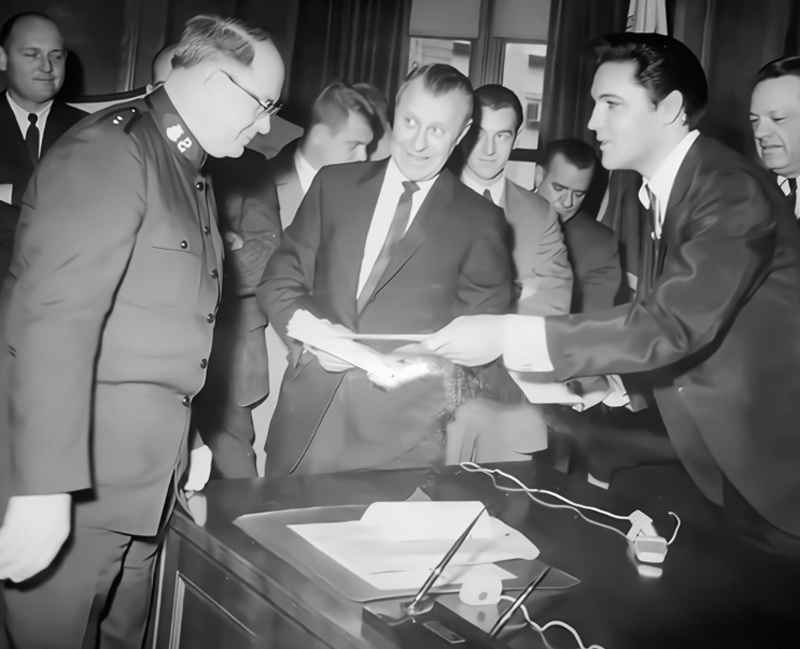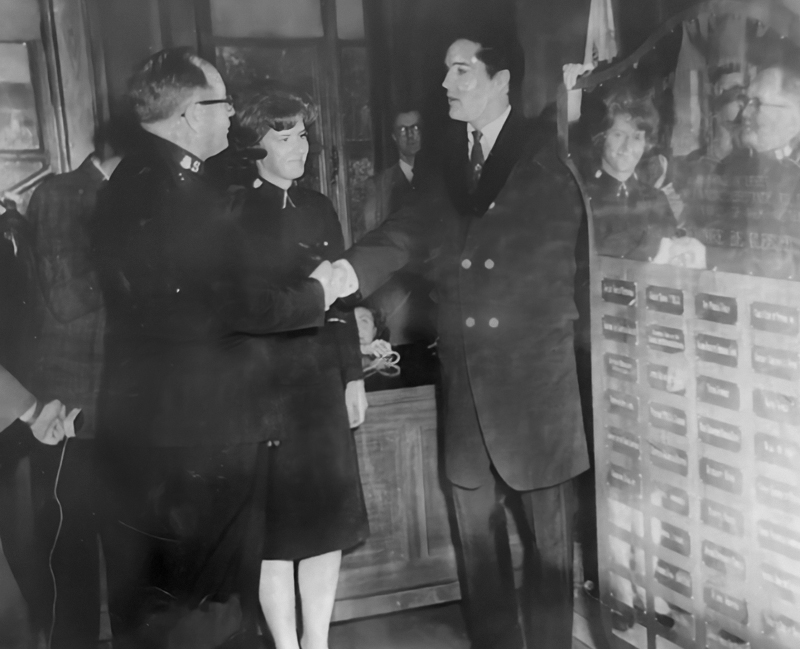
King of Rock and Roll Elvis Presley presents a gift to former Memphis Area Commander Brigadier Bramwell.
Please enter your name, email and zip code below to sign up!
Please enter your name, email and zip code below to sign up!
Please enter your name, email and zip code below to sign up!
Please enter your name, email and zip code below to sign up!
Please enter your name, email and zip code below to sign up!
Please enter your name, email and zip code below to sign up!
Please enter your name, email and zip code below to sign up!
Please enter your name, email and zip code below to sign up!
Please enter your name, email and zip code below to sign up!
Please enter your name, email and zip code below to sign up!
Please enter your name, email and zip code below to sign up!
Please enter your name, email and zip code below to sign up!
Please enter your name, email and zip code below to sign up!
Please enter your name, email and zip code below to sign up!
Please enter your name, email and zip code below to sign up!
Please enter your name, email and zip code below to sign up!
Please enter your name, email and zip code below to sign up!
Please enter your name, email and zip code below to sign up!
Please enter your name, email and zip code below to sign up!
Please enter your name, email and zip code below to sign up!
Please enter your name, email and zip code below to sign up!
Please enter your name, email and zip code below to sign up!
Please enter your name, email and zip code below to sign up!
Please enter your name, email and zip code below to sign up!
Please enter your name, email and zip code below to sign up!
Please enter your name, email and zip code below to sign up!
Please enter your name, email and zip code below to sign up!
Please enter your name, email and zip code below to sign up!
Please enter your name, email and zip code below to sign up!
Please enter your name, email and zip code below to sign up!
Please enter your name, email and zip code below to sign up!
Please enter your name, email and zip code below to sign up!
When The Salvation Army arrived in the United States in 1880, it committed to meeting the needs of all people in the name of Jesus. Within eight years, The Salvation Army had established a presence in Memphis at the corner of Washington and Front Streets and at Fifth Street in Chelsea. By 1890, it was holding services in a hall above Memphis Steam Laundry.
But it was in a small building on Adams Street, on October 18, 1900, that The Salvation Army began its lasting service to The Bluff City. Memphis was more than just another stop on the Army’s tour of southern cities—it was a community in need of its services. Less than a year after opening on Adams Street, the organization was already looking to establish a men’s shelter.
The founder and international leader of The Salvation Army, General William Booth, recognized the strong connection between Memphis and the Army when he visited on January 29, 1903. Speaking at First Methodist Church, Booth expressed the Army’s passion and determination to do the most good for the people of Memphis. His message was more than a sermon—it was a promise to the community. That promise kept the Army in Memphis even after its leaders endured quarantine during the smallpox epidemic.
With a heart for God and a hand extended to humanity, the Army sheltered hundreds of people each night during the harsh winter of 1931. Its love and compassion for the people of Memphis fueled its work through the Great Depression. Amid social and economic hardship, The Salvation Army opened shelters on Poplar Street and Adams Avenue, feeding thousands of families.
New and expanded services in the years following World War II touched countless Memphis families. Through utility and housing assistance, youth development programs, and disaster relief, The Salvation Army strengthened its commitment to serving the community. The Army even had help from the King of Rock and Roll himself: Elvis Presley. He proudly supported The Salvation Army as a way to give back to the city he loved so dearly.
Over the last 125 years, a shared dedication to doing the most good has led to an enduring partnership between The Salvation Army and the city of Memphis. The Purdue Center of Hope, dedicated in 2000, and the Memphis Kroc Center, opened in 2013, stand as two recent testaments to this mission. It is a lasting commitment to Memphis—first heard on Adams Street in 1900 and still heard today on Jackson Avenue, Kirby Whitten Road, East Parkway South, and everywhere in between.

King of Rock and Roll Elvis Presley presents a gift to former Memphis Area Commander Brigadier Bramwell.

Elvis Presley shakes the hands of former Salvation Army officers Brigadier Bramwell and Gertrude Purdue, who The Purdue Center of Hope is named after.
The Salvation Army, an international movement, is an evangelical part of the universal Christian Church.
Its message is based on the Bible. Its ministry is motivated by the love of God.
To preach the gospel of Jesus Christ and to meet human needs in His name without discrimination.
Passionate
Compassionate
Brave
Uplifting
Trustworthy
The Salvation Army’s commitment to Memphis – three major campuses on 33 acres with $150 million in capital investment – makes this one of the only cities in the U.S. to have all three signature programs in one location, working together throughout the year to stabilize lives for the children of tomorrow.
Because of Memphis’ long-term and interrelated problems of poverty, homelessness, addiction and violence, The Salvation Army has committed its resources to Heal Memphis with long-term solutions:
Services were provided in donated space until the 1970s, when Abe Plough chaired a capital campaign to repurpose a building for dormitory space at 200 Monroe. When that was sold to make room for AutoZone Park, the Kemmons Wilson family led the campaign to build the first specially designed Purdue Center of Hope at 696 Jackson.
Opened in 2000, with three shelters housing up to 130 people each night, today it is the largest provider of shelter and services to homeless women and children in Memphis. Addiction recovery, job placement and permanent housing are just some of the outcomes. Additionally, the Angel Tree program brings Christmas joy to thousands of children and seniors in need each Christmas, often preventing eviction or utility cutoff — and our Canteen Ministry and disaster relief continues to bring caring assistance to the front lines.
A residential work therapy program, the Mid-South Adult Rehabilitation Center (ARC) opened in 2009 at 2649 Kirby Whitten.
Family stores provide meaningful job training, and proceeds keep the ARC self-supporting, as 140 men work toward sobriety and rehabilitation.
Combined with Renewal Place and an Intensive Outpatient Program (IOP) at the Purdue Center of Hope, The Salvation Army is the largest provider of alcohol and drug recovery programs in Memphis. With spiraling addiction rates crippling the city’s resources and families, The Salvation Army is again at the point of critical need.
Finally in 2013, maximizing the Joan Kroc bequest with a capital campaign chaired by Meg and Scott Crosby, The Salvation Army opened the doors of the Ray and Joan Kroc Corps Community Center at 800 East Parkway South.
Here, on 15 acres in the heart of the city, in 100,000 square feet of innovative space, the Kroc Center provides arts, education, recreation and worship to people of all ages and backgrounds – including 10,000 members and 260,000 guests each year.
This proactive schedule builds individuals, families and neighborhoods, and ultimately, a more positive city — lessening the needs for critical services downstream.
To heal Memphis, it takes an army! Recognized for its iconic Red Kettle Campaign, which provides a vital portion of budget dollars, The Salvation Army continues to rely on local funding throughout the year.
Only with local support – more than 10,000 volunteers, 20,000 donors, and 200 congregations, civic groups, corporations and foundations – are ongoing services possible.
Thank you, Memphis, for helping us provide more than 120 years of service. We invite each of you to join this critical work, serving the hearts of many in the heart of the city.